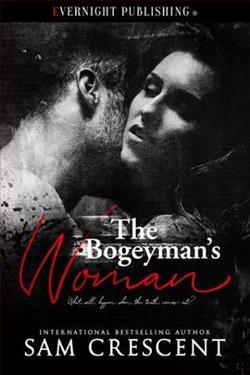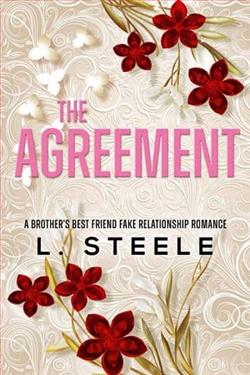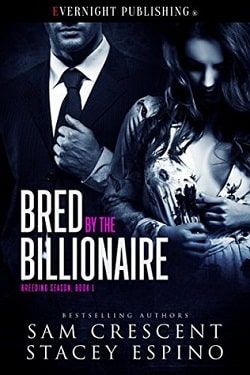Page 20 of Going Home in the Dark
When a nurse exited room 335 and came toward them, Rebecca put a hand on Ernie’s left shoulder and patted him affectionately and said, “Come Monday, you’ll be well enough to go back to Salt Lake City, Uncle Ralph.”
The nurse smiled at Bobby as though she wanted to wink but was determined to hold fast to the standards of her profession. When she heard “Salt Lake City,” she glanced at Rebecca. “Nutrisystem works. Marie Osmond is as cute as a button. I lost thirty pounds because of her.”
“Who hasn’t?” Rebecca said.
As the nurse continued north and they continued south, Bobby picked up the pace. When Rebecca warned him to stay casual, he began to move even faster. Bobby turned right into the elevator alcove at such speed that she half expected Ernie to shift violently, slide out of the wheelchair, and sprawl across the floor. But as if Ernie were in fact a Mormon loath to make a spectacle of himself, he rode out the turn with his dignity intact.
Four cabs occupied the alcove. Spencer stood in number three, index finger on thehold doorbutton.
Bobby wheeled amigo Ernie into the cab, and Rebecca followed, and Spencer pressed theclose doorbutton.
“We’re not in a wheelchair race,” Rebecca reminded Bobby.
“You know me,” he said. “I’ve got to move. I feel safe when I’m moving. The faster and farther I move, the safer I feel.”
“So you go to Bosnia and Borneo to write about Vermont.”
“I didn’t go to Borneo. I went to Tonga. The Kingdom of Tonga.”
“Why isn’t the door closing?” she asked.
Spencer said, “There’s a safety delay.”
The door closed. As the cab descended, Rebecca was so relieved that she sighed.
When the cab stopped at the second floor and the doors slid open, a uniformed hospital security guard stood there, waiting to come aboard, which is the kind of development necessary to maintain tension in any scene of escape. He was perhaps six feet two, maybe two hundred pounds, with a blunt face and marble-hard blue eyes that radiated suspicion and conveyed the impression he’d endured military service in a far land so dangerous that even poisonous snakes and sharp-toothed predators had fled the country in fear of the humans who ran the place. He entered the elevator cab with no possibility whatsoever that he would provide comic relief, and after a safety delay, the doors closed.
The guard carried a pistol in a holster on his right hip.
Fifteen years earlier, no security guard in a hospital would have been issued a firearm. In those days, people went to such noble institutions to be cured of an ailment or repaired after an injury or saved from imminent death. In those olden days, security guards were present largely to assist in the gentle restraint of druggies and drunks whose injuries were not serious enough to dissuade them from causing mayhem. Now that a lot of drugs were legal in numerous jurisdictions and were ravenously consumed, now that once self-aware and venerable professionals suchas physicians and educators were as likely as anyone to indulge in furious political rants on those social media platforms that encouraged idiocy, now that even young nurses with strong feminist inclinations posted nude photos to suggest that their passion for caregiving extended beyond tending to the lame and the sick, you never knew who might show up at a hospital, what their purpose might be, or what weapons they might be carrying. In another fifteen years, all infirmaries would probably be encircled by high walls crowned with razor wire and constantly patrolled by circling drones with laser weapons.
A name tag clipped to the pocket of the guard’s uniform shirt identified him asMichael Z.
As the lift descended once more, Michael Z habitually patted the gun in his holster as he made eye contact with Spencer, then with Bobby, then with Rebecca. He ignored Ernie, evidently because he could not imagine that anyone in a wheelchair might be a threat—a misjudgment that was likely to get him killed one day.
Many officers like this one, whether badge-carrying police or private security agents, were skilled at using silence to intimidate nervous suspects into self-incrimination. Rebecca doubted Michael Z meant to intimidate them. He just didn’t have anything to say.
Although Bobby was a fine novelist with an impressive command of the English language, his gift was limited to the written word; he possessed no acting talent. However, as a consequence of being fostered by the eccentric, often uncommunicative Adam and Evelyn Pinchbeck, Bobby was unsettled by prolonged silences among people. Although the descent from the second floor to the lobby at ground level required thirty seconds at most, he evidentlyfound the trip interminable and unsettling. As if reading from a script with a gun to his head in front of an audience of thousands, he said, “Come Monday, you’ll be well enough to go back to Salt Lake City, Uncle Osmond.”
Perhaps Michael Z had an ear for dialogue and recognized the anxiety revealed by Bobby’s strained and halting delivery of those fifteen words. Or it might have been the case that he found it odd or even suspicious that “Osmond” would be a first rather than last name. He studied Bobby with a squint-eyed stare sharp enough to peel a potato. That is hyperbole, of course, an obvious and intentional exaggeration; besides, there was no potato in the elevator on which to confirm or disprove that contention. Bobby clearlyfeltas if he were being peeled, however, and his ghastly expression only honed the security guard’s interest in him.
The fingers of Michael Z’s right hand, with which he habitually patted his pistol, curled around and tightened on the weapon’s grip, which caused Rebecca to hold her breath in dread. Actually, there was little chance that the security guard would shoot Bobby the Sham. Although it is standard practice in these violent times for authors to kill major characters early in—as well as all the way through—a novel, merely for the shock value, this is not that kind of story, nor is the storyteller in this case cavalier about the value of human life. Of course, the storyteller reserves the right to kill off characters much later in the book, if the logic of the plot and the emotional payoff for readers justify it, or if the storyteller finds one or more characters annoying.
Whether or not additional missteps on Bobby’s part might have ensured a confrontation with the security guard is moot. Sometimes fate intervenes in a dire situation to grant you a reprieve from being charged with stealing a dead body, which is whathappened in this instance. As the elevator arrived at the ground floor and the doors opened, a voice issued from the walkie-talkie clipped to the guard’s utility belt: “Michael, report to the gift shop. A situation is unfolding at the gift shop.”
Whatever Michael Z experienced during a previous career in the military or another perilous occupation, those events encouraged in him a Spartan attitude toward danger. His facial expression remained deadpan even when receiving this summons to what could be a mortal encounter. Some miscreant in the hospital gift shop might merely be shoplifting candy bars, or a drug-addled psychopath might he holding a knife to the cashier’s throat. Nevertheless, Michael Z hurried out of the elevator and rushed off with a stirring display of duty.
The lobby was small. People were coming to and leaving from visits with patients. Some looked worried, and others appeared put-upon, and a few were smiling as though thinking about an impending inheritance. No one showed any interest in the amigos. The exterior pneumatic doors whisked open as if the hospital were eager to be rid of them.
13Sudden Enlightenment in a Parking Lot
A kittenish breeze played through the sunny summer evening, chasing wisps of litter across the pavement, fluttering the leaves of the rows of maple trees that leaned their shadows eastward across the parking lot.
As Rebecca strode ahead of the wheelchair, she marveled at how adult she felt. Chronologically and biologically, she had been an adult for many years, but she realized that until now she had not felt like onebecause she had never matured psychologically.She’d taken upon herself theroleof an adult and had acted the hell out of it, just as she had been a nurse in theShriekseries, just as she had been Suzy Pepper, a wunderkind stock analyst and exuberant slut, inEnemies.Her opinions regarding the issues of the day had been adopted to match the opinions of the vast majority of people in the entertainment industry. Only now, having successfully spirited Ernie out of the hospital, did she understand that she didn’t know what she really thought about anything and therefore hadn’t become a fully rounded person. For the first time, she felt that she had the capacity to make wise decisions and take decisive actions without relying on the guidance of agents, business managers, image consultants, issue advisers, and the other gurus with which movie stars were barnacled. She realized that until now she hadgiven no thought to the meaning of life or the mystery of existence. She supposed she had gotten stuck in adolescence because of the events erased from her memory, but she understood now that the negligence of her libidinous mother and her grandparents’ constant efforts to infantilize her had lasting consequences with which she must deal if she were to survive the current crisis.
The foregoing might seem like an absurd amount of enlightenment to crash through Rebecca while she crossed sixty yards of a parking lot, and the reader might think this kind of thing happens only in fiction. In fact, the author can humbly attest that such moments befall us in real life. During a cross-country trip in July of 1989, I was driven to my knees by massive enlightenment while fueling my car in Flagstaff, Arizona, at an off-brand service station with the unlikely name of Terrible Herbst.
And so, as Rebecca led the way, Bobby the Sham followed with the wheelchair. He was still so rattled by his close encounter with the ominously silent Michael Z, he didn’t want to transport Ernie Hernishen in his rental car. “If I get pulled over by a cop, I won’t pass inspection. I need to calm down. If you put that security guard in a room for six hours with the people who fostered me, the only thing you’d hear is stifled coughs and farts. People that quiet creep me out.”















